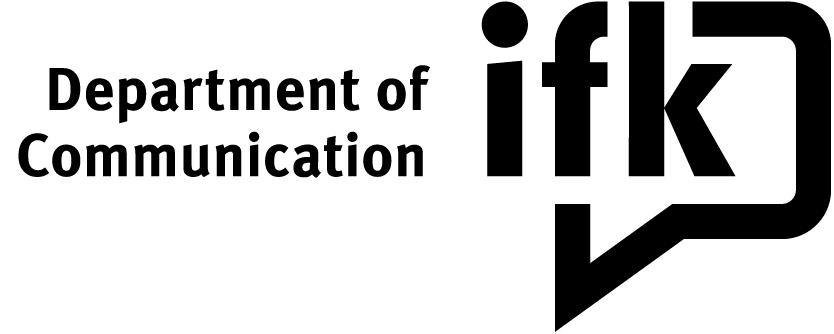The three year Ph.D course is separated into six semesters. Besides their course in communication studies, postgraduate students do not have to study a subsidiary subject. The course structure consists of three compulsory modules, each of which offers a range of seminars and other activities to choose from.
| Module I | Module II | Module III |
| Specialist module | Research colloquium | Other activities |
| 1 specialist module | 4-6 research colloquia | Methodology class |
| min. 5 credit points (ECTS) | Research colloquium | Teaching |
| max. 8 credit points | Research colloquium | Conferences |
| Research colloquium | Publication | |
| min. 12 credit points (ECTS) | Summer School | |
| Research colloquium | Academic writing class | |
| Research colloquium | Language class | |
| max. 18 credit points | and others | |
| u.a. | ||
| min. 34 credit points (ECTS) | ||
| max. 43 credit points |
The structured course programme can be divided into three phases. During the first phase, which includes the first and second semester of the doctoral degree course, the students are expected to hand in an exposé, drafted in close cooperation with their supervisor, and to present this paper in the research colloquium. The postgraduates may further attend a class from Module III, e.g. a methodology class, in order to enhance their knowledge on social science research.
During the second phase of the course, i.e. in the third and fourth semester, students select a specialist module. The module should be related to the topic of the Ph.D project and provide important stimuli especially with regard to theoretical input. Students may select an activity from Module III which is connected to their specialist module, e.g. they could join a supervised project group consisting of several Ph.D fellows. The research colloquia continually assess the doctoral research process.
The third phase of the course, i.e. the fifth and sixth semester, is the final phase of the course during which the students finish their dissertation. During their final year, the junior researchers can already present their results to a wider public either at conferences or in publications. These and similar assessments can be added up to the required credit points in Module III. In the final year, the doctoral candidates repeatedly have the opportunity to present and discuss their results in the research colloquia.
| Bereiche: | Dissertation | Module I and II | Module III |
Phase 11st and 2nd semester |
Literature review and evaluation Present exposé and develop dissertation structure in cooperation with supervisors Presentation in research colloquium |
Two research colloquia (2 x 3 ECTS) Specialist module (8 ECTS) |
Methodology class (7 ECTS) Passive attendance at a conference (2 ECTS) |
Phase 23rd and 4th semester |
Start writing dissertation Deliberate literature review and evaluation Presentation of selected chapters in research colloquia |
Two research colloquia (2 x 3 ECTS) |
Teaching assistance (8 ECTS) Passive attendance at a conference (2 ECTS) |
Phase 35th and 6th semester |
Write academic article or conference paper First draft of dissertation Discussion and revision of the draft |
Two research colloquia (2 x 3 ECTS) |
Co-authorship of a paper (5 ECTS) Active attendance at a conference or publication (10 ECTS) |
| Credit Points | 120 ECTS | 26 ECTS | 34 ECTS |
During the entire doctoral course the Ph.D students are closely advised and accompanied by their supervisor team. The Graduate School thus offers a supportive environment for an academic qualification and a successful Ph.D.

